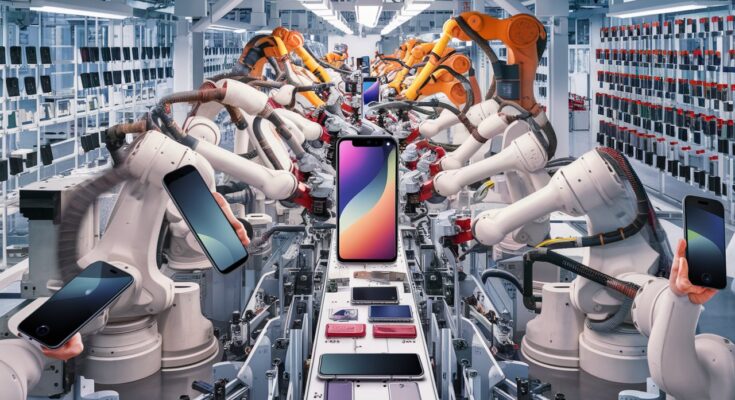Mobile Phones manufacturing has significant environmental impacts from raw material extraction to e-waste. Discover sustainable practices, the role of rare earth elements, and how consumers can make eco-friendly choices.
Introduction
Mobile phones have become an indispensable part of our daily lives, but have you ever wondered about the environmental impact of manufacturing these devices? As we delve into this topic, it’s crucial to understand the various stages of production and the associated environmental footprint. This article will explore the environmental consequences of mobile phone manufacturing, from raw material extraction to disposal, and highlight steps that can be taken to mitigate these impacts.
Materials Used in Mobile Phone Manufacturing
Common Materials
Mobile phones are made from a mix of materials, including metals like aluminum, copper, and gold, as well as plastics and glass. These materials provide the structural integrity and functionality that we expect from our devices.
Rare Earth Elements
Rare earth elements (REEs) such as neodymium, praseodymium, and dysprosium are crucial for the performance of mobile phones, especially in their batteries and screens. However, the extraction of REEs poses significant environmental challenges.
Environmental Concerns
The extraction and processing of these materials result in substantial environmental degradation, including habitat destruction, soil erosion, and contamination of water sources with heavy metals and toxic chemicals.
Extraction of Raw Materials
Mining Processes
Mining for metals and rare earth elements involves intensive labor and machinery, leading to significant land disturbance and energy consumption. Open-pit mining and underground mining both contribute to these impacts.
Impact on Ecosystems
Mining activities often lead to deforestation and loss of biodiversity. Wildlife habitats are destroyed, and ecosystems are disrupted, resulting in long-term ecological damage.
Human Rights Issues
In many regions, mining operations are associated with poor labor conditions and exploitation. Workers often face hazardous environments, low wages, and limited protections.

Production Process
Energy Consumption
Manufacturing mobile phones requires a significant amount of energy. The production of components like semiconductors and circuit boards is particularly energy-intensive, contributing to greenhouse gas emissions.
Emissions from Factories
Factories that produce mobile phones release pollutants into the air and water. These emissions include volatile organic compounds (VOCs), sulfur dioxide (SO2), and carbon dioxide (CO2), all of which have adverse effects on the environment and human health.
Water Usage
The production process also consumes large quantities of water, which can lead to water scarcity in regions where water resources are already limited.
Toxic Chemicals in Manufacturing
Types of Chemicals
Mobile phone manufacturing involves the use of toxic chemicals such as lead, mercury, cadmium, and brominated flame retardants. These substances are harmful to both human health and the environment.
Health and Environmental Risks
Exposure to these chemicals can cause serious health problems for workers and surrounding communities. Additionally, improper disposal can lead to soil and water contamination.
E-Waste Generation
What is E-Waste?
Electronic waste (e-waste) refers to discarded electronic devices, including mobile phones. With the rapid turnover of technology, e-waste has become a growing environmental concern.
Statistics on Mobile Phone Waste
Millions of mobile phones are discarded each year. According to recent estimates, less than 20% of e-waste is properly recycled, with the remainder ending up in landfills or incinerators.
Disposal and Recycling Challenges
Recycling mobile phones is challenging due to the complexity of their components. Many phones contain hazardous materials that require specialized handling to recycle safely.
Lifecycle of a Mobile Phone
From Production to Disposal
The environmental impact of a mobile phone spans its entire lifecycle. From raw material extraction to manufacturing, usage, and disposal, each stage has its own set of environmental challenges.
Environmental Footprint at Each Stage
- Extraction: Resource depletion and ecosystem damage.
- Production: High energy consumption and emissions.
- Usage: Energy usage during charging.
- Disposal: E-waste generation and potential for toxic leakage.
Energy Consumption of Mobile Phones
During Production
The production of mobile phones is energy-intensive, with significant consumption during the manufacturing of components like displays and processors.
During Usage
While in use, mobile phones consume relatively low amounts of energy compared to other electronic devices. However, the cumulative impact is significant given the billions of devices in use globally.
Charging and Its Impact
The energy required to charge mobile phones contributes to their overall environmental footprint. Choosing energy-efficient chargers and promoting renewable energy sources can help mitigate this impact.

Packaging and Transportation
Environmental Impact of Packaging Materials
The packaging of mobile phones often involves plastics, cardboard, and other materials that have environmental impacts. Reducing packaging waste and using recyclable materials are essential steps toward sustainability.
Carbon Footprint of Transportation
Transporting mobile phones from manufacturing facilities to consumers involves considerable carbon emissions. This includes air, sea, and land transport, all contributing to the device’s overall carbon footprint.
Sustainable Practices in the Industry
Green Manufacturing Initiatives
Many companies are adopting green manufacturing practices to reduce their environmental impact. These initiatives include using renewable energy, reducing waste, and improving energy efficiency.
Use of Recycled Materials
Incorporating recycled materials into mobile phone production can significantly reduce the need for raw material extraction and lower the overall environmental impact.
Energy-Efficient Technologies
Advancements in technology are enabling the production of more energy-efficient components, leading to reduced energy consumption during both manufacturing and usage.
Corporate Responsibility
Examples of Companies Leading in Sustainability
Some companies are setting industry standards by prioritizing sustainability. For example, Apple has committed to becoming carbon neutral across its entire business by 2030.
Corporate Social Responsibility (CSR) Programs
CSR programs play a crucial role in driving sustainable practices within the mobile phone industry. These programs often focus on environmental conservation, community support, and ethical labor practices.
Government Regulations and Policies
Existing Laws and Regulations
Governments around the world have implemented regulations to minimize the environmental impact of electronic devices. These include restrictions on hazardous substances and mandatory recycling programs.
Impact on Mobile Phone Manufacturing
These regulations compel manufacturers to adopt cleaner production methods and ensure that their products are easier to recycle, ultimately reducing the environmental footprint.
Consumer Responsibility
How Consumers Can Reduce Impact
Consumers have the power to drive change by making informed choices. Opting for eco-friendly devices, reducing consumption, and supporting sustainable brands can collectively make a significant difference.
Choosing Eco-Friendly Products
When purchasing a new mobile phone, consider models that use recycled materials, are energy-efficient, and come from companies with strong sustainability commitments.
Recycling and Proper Disposal
Proper disposal of old devices is crucial to minimize e-waste. Many manufacturers and retailers offer recycling programs that ensure phones are disposed of responsibly.
Innovations in Mobile Phone Manufacturing
Technological Advancements
Innovations in technology are paving the way for more sustainable mobile phone manufacturing. This includes the development of biodegradable materials and more efficient production processes.
Eco-Friendly Materials and Processes
Research is ongoing into the use of alternative materials that are less harmful to the environment. For instance, some companies are exploring the use of plant-based plastics and other sustainable materials.
Conclusion
Understanding the environmental impact of mobile phone manufacturing is essential as we move toward a more sustainable future. By considering the entire lifecycle of these devices, from raw material extraction to disposal, we can identify key areas for improvement. Embracing sustainable practices, supporting responsible companies, and making informed consumer choices are vital steps in reducing the environmental footprint of mobile phones.

FAQs
1. What are the main materials used in mobile phone manufacturing?
- Mobile phones are primarily made from metals like aluminum, copper, and gold, as well as plastics and glass. Rare earth elements are also used in their components.
2. How does mobile phone production impact the environment?
- The production process involves significant energy consumption, emissions of pollutants, and the use of toxic chemicals, all of which have adverse environmental effects.
3. What is e-waste, and why is it a problem?
- E-waste refers to discarded electronic devices. It poses environmental challenges due to the hazardous materials contained in these devices, which can contaminate soil and water.
4. How can consumers reduce their environmental impact when buying mobile phones?
- Consumers can choose eco-friendly devices, support brands with strong sustainability commitments, and ensure proper recycling and disposal of old phones.
5. What are some sustainable practices in mobile phone manufacturing?
- Sustainable practices include using recycled materials, adopting green manufacturing initiatives, improving energy efficiency, and supporting corporate social responsibility programs.

